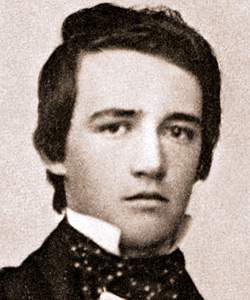Horace White (American National Bibliography)
White stayed closely allied to Lincoln as a coauthor of his 1860 campaign biography and vowed to the new president that he and other young Republicans stood ready to "plunge into blood to the horses bridles" to defend the new administration.
Horace White (Biographical Sketches)
Horace White was born in Colebrook, Coos County, New Hampshire, August 10,1834. His father was a physician of high repute in his profession, and possessed unusual force of character. In the winter of 1836—7, Dr. White undertook a journey from northern New Hampshire to the Territory of Wisconsin, to select a site for a company or colony of New England settlers, who proposed, with himself, to find new homes in the distant West. Dr. White, with his horse and sleigh, accomplished this journey of some three thousand miles, going and returning, in the winter, and selected the site of the present city of Beloit as the future home of himself and associates. In the following summer, he brought his family to Beloit, and took up his abode in the only house in the place, a log structure which might have been taken for a fort, and which was, perhaps, constructed with a view to possible defensive operations against the Indians.
Dr. White died in the year 1843, at the early age of thirty-three, leaving a widow and four infant children, of ivhom Horace was the eldest.
In 1846, Mrs. White was again married, her second husband being Deacon Samuel Hinman, of Prairieville (now Waukesha), Wisconsin. He was a man of most interesting and exemplary character, whose affectionate care and judicious guardianship of the orphan children thus committed to his charge are remembered by them with filial gratitude. The family removed to Mr. Hinman's farm, near Prairieville, shortly after the marriage, where they remained three years. In 1849, Mr. Hinman removed to Beloit for the purpose of educating his children, and Mr. White entered Beloit College the same year, from which he graduated in 1853. In January, 1854, being then but nineteen years of age, he came to Chicago, and was employed first as " local," and afterwards as assistant editor, of the "Evening Journal." The daily newspapers of Chicago at that time were: The "Tribune," conducted by Thomas A. Stewart; the " Democrat," by John Wentworth; the " Democratic Press," by John L. Scripps and William Bross; and the "Journal," by R. L. & C. L. Wilson. Receiving the appointment of Agent of the Associated Press, he left the " Journal" in 1855. In the following year, he was chosen Assistant Secretary of the National Kansas Committee, whose headquarters had been fixed at Chicago; and, upon the disbandment of that organization, in 1857, he entered the office of the Chicago " Tribune," then published by the firm of Ray, Medill & Co., as an editorial writer. Since that date, he has been constantly connected with the " Tribune," although three years (from 1861 to 1864) were principally passed in Washington city, he acting as correspondent of the paper at the National Capital.
In 1864, Mr. White purchased an interest in the " Tribune," and in 1865 became its editor-in-chief, which position he now holds. He is known as a tireless worker, a ready thinker, a terse, powerful writer, a man of universal information and extraordinary endurance.
Horace White (Who's Who)
Horace White (Chicago Tribune)
HORACE WHITE
By the death of Horace White American journalism loses a figure of distinction and the nation a publicist of weight and discernment.
Mr. White was an American, veille roche, one of those men whose conception of American principle and destiny gave to the nation its moral structure and to the democratic experiment its hope of sane and pure accomplishment. He was, in his eighty-second year, one of the oldest of the American liberals, a forward looking man of his day and of our day as well. As a student of finance Mr. White’s opinion had an especial influence, but he was also a veteran of the unending struggle for sound political reform.
Mr. White was for a time editor and a controlling stockholder of THE TRIBUNE and retained to the end not only a financial but also a kindly personal interest in this newspaper. We express there in a special sense the country’s loss of a high minded, patriotic, and useful citizen.
Horace White (Sparks, 1908)
MR. HORACE WHITE
Mr. White, the official reporter of the Debates for the Chicago Press and Tribune, was born in New Hampshire 1834. When three years of age, he was taken with the to Wisconsin Territory, where the city of Beloit now stands. In 1849, Horace entered Beloit College, was gradated in 1853, and became a reporter on the Chicago Evening Journal. In 1857 he spent a short time in Kansas, returning to Chicago to become an editorial writer on the Chicago Press and Tribune. While holding this position, he was designated as chief correspondent to accompany Abraham Lincoln in 1858 on his campaign against Stephen A. Douglas for the United States senatorship. The notable features of this campaign were given to the public chiefly through Mr. White's letters to the Chicago Tribune, and were subsequently condensed by him at the instance of Wilham H. Herndon and published in the latter 's Life of Lincoln. (2d ed., D. Appleton & Co., New York).



